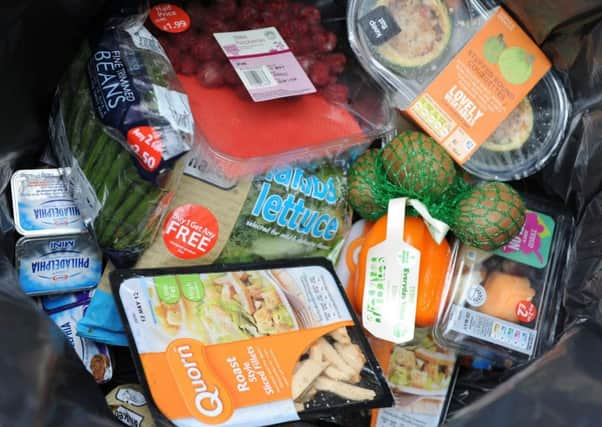Andrew Vine: Time to revive spirit of waste not, want not


When it’s her turn at the counter, she and the butcher chat away while he wraps up her order. She doesn’t even need to ask for it, because she’s been a customer for years and always buys the same thing. Two sausages and two small chops.
Very occasionally, she wrong-foots him and asks for his smallest chicken, explaining that her friend is staying for the weekend.
Advertisement
Hide AdAdvertisement
Hide AdShe isn’t buying these small amounts of meat because she’s short of money, but because they are ample for her and exactly what she requires, no more and no less. I’d bet not a morsel of food is wasted in her home, even down to the bones of that small chicken being used to make stock.
To people of her generation – and a couple more that followed – wasting food is anathema. It’s an attitude of mind that decreed that whatever wasn’t cleaned off the plate at the table was bound not for the bin, but for the cold slab or fridge, to be used another day.
An armoury of recipes for leftovers seemed to exist in the collective folk memory, things like rissoles, bubble-and-squeak and potato cakes, and tips for deploying flour, beaten egg or the breadcrumbs of stale loaves to make the old into new were handed down within families.
This is a mindset we would do well to revive, since families are needlessly creating a financial squeeze for themselves by producing an avalanche of wasted food that is perfectly good and safe to eat. Countless tonnes are pouring into landfill sites when it should still be in the fridge or on the table.
Advertisement
Hide AdAdvertisement
Hide AdThe amount of waste, and its cost, is staggering according to a survey of a few days ago. The average family is throwing away £60 of food every month, or the equivalent of six meals a week.
The food industry is hardly better. The survey follows hard on the heels of figures produced by Tesco, which estimated that in the first six months of this year, it wasted 30,000 tonnes of food. And all this at a time when the poorest families of all are reliant on food banks to help them put meals on the table.
This dreadful waste of food is a consequence of both our affluent society and the way we shop. Families with more disposable income than a couple of generations ago stock up once a week and then unthinkingly dump what is left over when they refill the fridge the following Saturday.
Supermarkets have vastly increased the range and availability of the food we can buy, but they have also sapped the confidence of too many people to trust their eyes and nose to tell them when it has reached the point where there is no alternative to throwing it away, instead of being dictated to by the use-by date on the plastic it comes wrapped in.
Advertisement
Hide AdAdvertisement
Hide AdMultibuy offers tempt shoppers into buying more than they need or can immediately use or store, and a lot of those two-for-ones end up in landfill as well.
The old saw, “waste not, want not”, has passed out of general use because we live in a land of plenty, which – happily – does not suffer from food shortages. The lady from the butcher’s shop, on the other hand, belongs to the generation that went through the Second World War and the lean years that followed, and undoubtedly knows what shortages were like.
My own generation was the offspring of parents who had grown up during the Great Depression of the 1930s, during the war, or in the years of rationing afterwards. Food had been precious, and not wasting it was part of their DNA. They passed that on, not by preaching but by example.
There was nothing austere or mean-minded about it. There was always more than enough to eat, but very little was wasted, thanks to all those ingenious recipes for leftovers that everybody seemed to know.
Advertisement
Hide AdAdvertisement
Hide AdBecause there were more stay-at-home mothers, shopping was done on a daily rather than weekly basis. Enough for that evening’s meal was bought in the morning, brought home and cooked, leaving the fridge looking a little bare until it was filled up again after the next day’s visit to the butcher or fishmonger. Today’s wardrobe-sized fridges stuffed to bursting with food bought a week earlier would have been unthinkable to many families.
Equally unthinkable to most families now would be taking three £20 notes out of purse or wallet and setting them on fire outside the supermarket, instead of troubling to push a trolley round inside.
But they might just as well do that, because it’s costing them £60 a month in wasted food. It’s high time to look with fresh eyes at the mindset of the lady with her two sausages and two chops, and glance over our shoulders at the example of older generations.
For if we do, we shall not only learn much about buying what we need rather than what we’re tempted into, we shall find ourselves a little wealthier too.